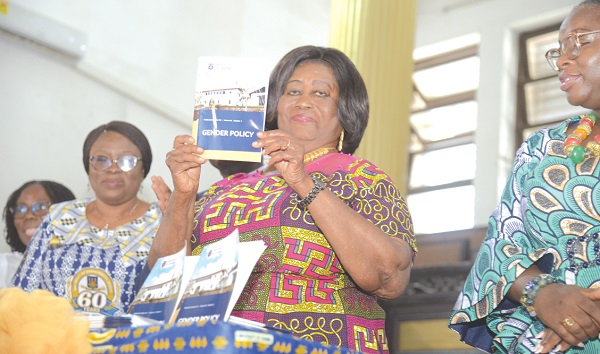The University of Ghana has launched a gender policy aimed at mainstreaming the issue of gender equity in all sectors of the university to enable the realisation of optimal productivity.
The policy will cover the university’s gender principles, which include issues concerning staff appointments and promotion, and students enrolment and retention as well as grievance procedures and processes for redress and monitoring and evaluation mechanisms among others.
The purpose of the policy is to address the issue of imbalance in the representation of females in the student population, teaching, administrative, technical and senior management position by providing equal opportunity to members and prospective members of the university community, regardless of sex.
Therefore, it would provide a framework document for achieving a gender equitable environment that engages both males and females in all critical spheres of decision-making.
It would also create an environment that values diverse perspectives on the basis of gender equality, harnesses potentials and is supportive of men and women's diverse skills, perspectives and knowledge.
At the launch held recently in Accra, the Chancellor of the university, Mary Chinery-Hesse, underscored the importance for the university to have such a policy that was binding, and also In line with the national gender policy to ensure that all were treated equally both within the university and within the broader Ghanaian social space.
She, however, lamented that in spite of the progress being made in gender parity, the university still faced critical issues of gender imbalance, citing female participation in Science, technology, engineering, and mathematics (STEM) related programmes and the study of Information Technology (IT) as an example.
She said “the percentage of female students studying IT courses currently stands at just 20 per cent. There is also the issue of the proportion of women in senior academic roles, and the voice of women in decision-making at all levels in the University,”
Mrs Chinery-Hesse, therefore, affirmed the university’s commitment against all forms of gender based discrimination and the forging of an environment where everyone, regardless of their gender had equal opportunity for their growth, development and self-realisation.
The Vice Chancellor of the university, Professor Nana Aba Appiah Amfo, noted that as an institution committed to the realisation of Sustainable Development Goal (SDG) 5 which focused on Gender Equality, the university had always, even before the launch of the policy, been working to create an environment free from bias, stereotypes, and discrimination.
“It may interest you to know that the University of Ghana is the first university in Ghana to set up a Gender Centre (now the Centre for Gender Studies and Advocacy) way back in 2005.”
UG is also the first university in Ghana to develop a Sexual Harassment Policy, and today, the University is leading the charge as the first public University in Ghana to develop a Gender Policy,” she said.
Prof. Amfo was therefore hopeful that other tertiary institutions would emulate the university’s initiative to protect both men and women in the realisation of their goals and called on all stakeholders to work together for its success.

